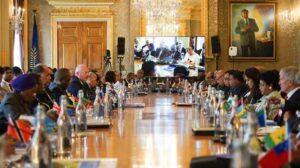In a recent statement, Britain’s Foreign Secretary, David Lammy, emphasized that the United Kingdom does not support financial reparations as a form of justice for its role in the transatlantic slave trade. Speaking during a visit to Nigeria, Lammy, who has Guyanese heritage, called slavery “horrendous” and acknowledged the lasting scars it has left on millions of descendants. However, he clarified that Britain’s focus lies in fostering forward-looking partnerships rather than discussing direct monetary compensation.
“People want to think about the future,” Lammy remarked in an interview with the BBC, underscoring the country’s stance on avoiding financial reparations, particularly during a global cost-of-living crisis. “It’s not about the transfer of cash, particularly at a time of economic strain,” he said, indicating that Britain is pursuing other avenues of justice and development in its foreign relations with former colonies.
The issue of reparations for slavery has gained significant momentum, particularly at the recent Commonwealth Heads of Government Meeting, where leaders of former British colonies, including Caribbean and African nations, called for a “meaningful, respectful, and truthful” dialogue on reparatory justice. Britain’s role in the slave trade has long been acknowledged but has yet to be addressed through a formal apology or reparative actions.
Also, read; Mauritius Lifts Social Media Ban Following Public Outcry Ahead of Elections
Lammy stressed that the UK’s approach now involves “respectful partnerships” aimed at long-term growth and stability, particularly across African nations. “Our focus is on building freer, safer, and more prosperous societies,” he added, positioning the UK’s diplomatic efforts toward mutual development goals rather than addressing past injustices through compensation.
The Foreign Secretary’s remarks come amid a global reckoning on slavery and colonial history. While several European nations, including the Netherlands, have issued apologies for their involvement in the slave trade, the UK has so far refrained from a formal apology. Recently, however, King Charles III hinted at the need for an acknowledgment of history during the Commonwealth summit, advocating for dialogue that fosters an understanding of the past. He urged leaders to find “the right language” to help address inequalities that persist today.
Lammy’s statements align with Britain’s broader diplomatic strategy, which seems to prioritize practical development and economic collaboration over revisiting historical grievances. Yet, the call for reparatory justice remains strong among former British colonies, and many continue to seek acknowledgment and redress for the injustices of slavery. For these nations, the debate over reparations extends beyond financial compensation, emphasizing the need for a historical reckoning that acknowledges the full scope of Britain’s role in the transatlantic slave trade.
